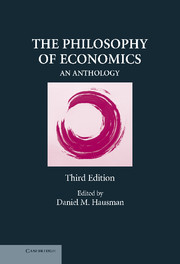Book contents
- Frontmatter
- Contents
- Introduction
- PART ONE CLASSIC DISCUSSIONS
- PART TWO POSITIVIST AND POPPERIAN VIEWS
- PART THREE IDEOLOGY AND NORMATIVE ECONOMICS
- 11 Science and Ideology
- 12 Welfare Propositions of Economics and Interpersonal Comparisons of Utility
- 13 The Philosophical Foundations of Mainstream Normative Economics
- 14 Why Is Cost-Benefit Analysis So Controversial?
- 15 Capability and Well-Being
- PART FOUR BRANCHES AND SCHOOLS OF ECONOMICS AND THEIR METHODOLOGICAL PROBLEMS
- PART FIVE NEW DIRECTIONS IN ECONOMIC METHODOLOGY
- Selected Bibliography of Books on Economic Methodology
- Index
14 - Why Is Cost-Benefit Analysis So Controversial?
Published online by Cambridge University Press: 05 June 2012
- Frontmatter
- Contents
- Introduction
- PART ONE CLASSIC DISCUSSIONS
- PART TWO POSITIVIST AND POPPERIAN VIEWS
- PART THREE IDEOLOGY AND NORMATIVE ECONOMICS
- 11 Science and Ideology
- 12 Welfare Propositions of Economics and Interpersonal Comparisons of Utility
- 13 The Philosophical Foundations of Mainstream Normative Economics
- 14 Why Is Cost-Benefit Analysis So Controversial?
- 15 Capability and Well-Being
- PART FOUR BRANCHES AND SCHOOLS OF ECONOMICS AND THEIR METHODOLOGICAL PROBLEMS
- PART FIVE NEW DIRECTIONS IN ECONOMIC METHODOLOGY
- Selected Bibliography of Books on Economic Methodology
- Index
Summary
Robert H. Frank (1945–) holds a B.S. in math from Georgia Institute of Technology and an M.A. in statistics and a Ph.D. in economics from University of California, Berkeley. Since serving as a Peace Corps volunteer in Nepal, he has been an economics professor at Cornell University. His “Economic Scene” column appears monthly in the New York Times. His work at the intersection of economics and ethics has focused on moral emotions and concerns about relative position.
Overview
The cost-benefit principle says we should take those actions, and only those actions, whose benefits exceed their costs. For many, this principle's commonsensical ring makes it hard to imagine how anyone could disagree. Yet critics of cost-benefit analysis are both numerous and outspoken. Many of them argue that cost-benefit analysis is unacceptable as a matter of principle. I begin by noting why many find this argument largely unpersuasive. I then examine several conventions adopted by cost-benefit analysts that do appear to yield misleading prescriptions. Finally, I consider the possibility that the cost-benefit principle may itself suggest why we might not always want to employ cost-benefit analysis as the explicit rationale for our actions.
The Incommensurability Problem
The cost-benefit principle says we should install a guardrail on a dangerous stretch of mountain road if the dollar cost of doing so is less than the implicit dollar value of the injuries, deaths, and property damage thus prevented. Many critics respond that placing a dollar value on human life and suffering is morally illegitimate.
- Type
- Chapter
- Information
- The Philosophy of EconomicsAn Anthology, pp. 251 - 269Publisher: Cambridge University PressPrint publication year: 2007
- 2
- Cited by

